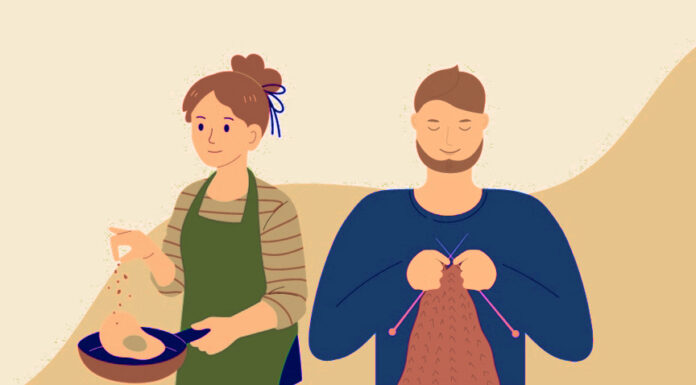Work, work, work. Rush, rush, rush. This is the life of a typical American, with many residents skipping meals or ordering takeout often, but three UNLV professors think American culture should slow down. They claim that there should be more appreciation for tasks that intentionally slow us down, tasks like knitting and cooking.
English professor and head of the Honors College Knitting Club Maria Jerinic says, “I’m not a crafty person. I would say I’m creative primarily in terms of my writing, but something about knitting is very relaxing.”
According to the book, “History of Hand Knitting,” knitting is speculated to originate from the Middle East, with many Arabic blessings knitted into garments. It soon traveled to Europe, with men in Scotland working in factories to knit stockings, shawls and hats. It’s a craft that became heavily gendered, with the stereotype being that grandmas are the only ones to enjoy this activity. Jerinic adds, “[Knitting is] a creative activity that actually has incredible mental health benefits…I was drawn to it because it’s relaxing and it’s soothing. So much of my job is in my head and yarn is so physical and tactile…At home, I have a sweater that’s more complicated, and that’s good because when I’m working on it, I have to focus on it. I can’t think about other things; I can’t worry; I can just focus, and my mind can take a break.”
Another professor, Donovan Conley, claims American cultural perceptions on food and cooking need to change. Much of the joy in cooking has fallen to the wayside. According to Britannica, cooking is one of humanity’s oldest practices, with researchers confirming that as soon as humans learned to start a fire, they used it to prepare food. Americans have started to put cooking on the back burner, with Gitnux Market Data reporting that the average American household spends $3,008 on eating out and that Americans spend almost 20 percent of their food budget on eating out. Additionally, the food delivery market is estimated to be worth $150 billion according to McKinsey & Company. Conley studies rhetoric around food, particularly how certain foods are deemed “healthy” and “unhealthy.” He shares, “I feel very similar about chopping onions. When I’m cooking, I just turn off. Sometimes I’ll put on music or a podcast and I love being in that bubble. It’s meditative and creative and wonderful. And it would be wonderful if other people saw that. If you care about cooking, you care about where your food comes from, you care about how much it costs. You care, care, care, care, care. If we had more people deliberately going to buy things, maybe our grocery stores wouldn’t be so depressing and filled with modified commodities and processed crap.”
Both Jerinic and Conley share a need to slow down to appreciate the intricacies of both tasks. Dance professor Louis Kavoruras shares a similar sentiment. He advises, “It doesn’t matter whether it’s food that does it for you, if it’s a Brancusi sculpture or if it’s knitting an amazing sweater. Take the time to live in the senses. I always tell people, it’s really about the senses. So much of how we encounter the world is through our senses. Take the time to sense the world and give yourself the time so that you’re not rushing, and you’re really experiencing the here and now of the world.”

